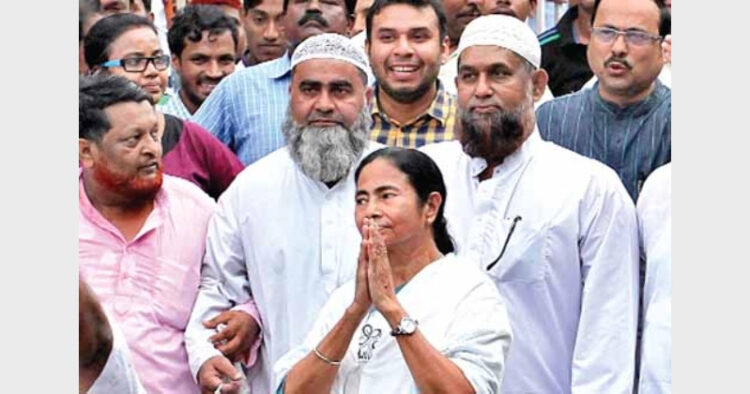In 2011, Mamata Banerjee ousted the Communists ending their 34-year-old monopoly in Bengal politics. Her battle cry was ‘Poribortan’ that promised change for better. Yet Mamata’s tenure has been full of controversies such as Burdwan blasts, Malda riots and the Saradha scam among several others, this time Bengal is craving for another ‘Poribortan’
Political observers, both within and outside West Bengal, should not miss the significance of what’s happening in the State. Mamata Banerjee came to power on the promise of ‘Poribortan’ and intent to correct the wrongs of over three-decade Communist rule in the state. And yet in the last five years of her rule from Writers’ Building she continues with the malpractices of Communist rule. So, misgovernance, reckless minority appeasement and political goondaism have continued unabated in her tenure.
Test of a good democracy is decided during elections. They opted for such a regime change in 2011 and helped Mamata Banerjee create ‘her-story’ – a sharp contrast to the history of the Marxists. But what did they achieve?
All eyes on Poribortan -2
But heart in heart, brushing aside all fears of booth-level goondaism, the people of Bengal are clamouring for an effective alternative, the Poribortan-2.
|
What BJP needs to do? There is a visible nervousness in Marxist camps about good show by BJP. More so because they feel the tie up with Congress at many places has gone down well, but there are areas where this strategy can boomerang. Congress party’s anti-Naxal dictatorial style of governments under leaders like Siddhartha Shankar Ray still makes a sizeable Bengali population angry. Marxist leaders feel this section of voters may get diverted towards BJP. |
The first Poribortan in 2011 brought in Saradha chit fund scam, mindless minority appeasement in border district of Malda and recovery of huge cache of arms. People deserve alternative to both the Marxits and Didi’s Trinamool. Look at the irony of Bengal politics too. The Congress party exists nowhere on its own and CPI (M)-led Left Front is so much marginalised that it has joined hands with the Congress, whom it fights relentlessly in Bengal, Tripura and Kerala.
It would not be wrong to suggest therefore that with these issues in mind, people can look towards the BJP. In fact, an overwhelming voters preferred BJP in 2014 Lok Sabha elections and thus helped the saffron outfit increase their voting percentage substantially. The party put up its best ever performance in West Bengal in the 2014 Lok Sabha polls bagging nearly 17 per cent votes – a sort of unimaginable jump from a mere four per cent in the 2011 assembly elections.
“The onus is now again on the BJP to make up their organisational weaknesses and undertake booth management with cadres and whatever resources we have,” says a sitting BJP lawmaker who has been travelling across the State.
Not many in BJP can disagree with such frank admissions. In this endeavour BJP of course hopes to be assisted by the ‘saffron party’s’ goodwill and ‘the Narendra Modi phenomenon’, they say. Reports from districts like Birbhum and Murshidabad say BJP candidates are able to enlist the services of middle class intellectuals and traditional RSS supporters too.
But the political reality is that these are pretty tall order and everyone suspects whether BJP can bring in all these and translate the goodwill to votes.
“Why not?” retorted a party leader in Kolkata and claimed that Prime Minister Narendra Modi’s Kharagpur rally had been very successful.
Moreover, there is a reading that the strategic poll understanding and so-called seat adjustments between Congress and the Left parties and their “greater engagement in fight against Mamata Banerjee-led Trinamool Congress” could only give an added advantage to the BJP.
BJP strategists therefore believe there is an “upsurge of nationalism and pro-BJP sentiment” in Malda and other “development-starved” districts. The reports about recovery of huge cache of arms and ammunition from sensitive districts like Malda, Mushidabad and Birbhum have forced people to “rethink” about their voting pattern.
BJP leader Kailash Vijayvargiya seems to understand this ground reality. “All other political forces Congress, Left and Trinamool have failed the people. West Bengal’s political scene experienced a shift in 2011 when people made up their mind to vote out the communists. In 2014 due to Saradha scam and Narendra Modi wave, we did well in Lok Sabha polls. In fact after Burdwan blast in October 2014, BJP has on number of occasions put Trinamool on the back foot,” he says.
In a recent incident, Trinamool Congress attempted to defame BJP's national secretary Rahul Sinha through a sting operation which shows its nervousness.
Left-Congress bonhomie
But nevertheless the hard fact on ground remains that the Communists-Congress understanding is considered a game changer more so because in many pockets BJP would not have enough cadres to win over the floating voters. “Mamata Banerjee faces strong anti-incumbency wave. Congress lost credibility and for Left, Bengal polls is fight for survival,” analyses longtime Bengal watcher and a sitting Trinamool MP on the condition of anonymity. He says Didi did a mistake by antagonising Prime Minister Modi.
Citizens also understand this. Nepali voters in Siliguri area are already talking about TMC-BJP realignment once “bitterness” of polls is over and that insist such a scenario “would not be bad for development” of Darjeeling and other hilly areas.
According to ear-on-ground account, the BJP is expected to do well in select pockets in Malda, Jalpaiguri and Murshidibad districts as also hubs like Asansol, Burdwan and parts of Kolkata.
In 2011, Mamata Banerjee ousted the Leftists ending their 34-year-old monopoly on Bengal politics. But a contagious and menacing influence on Bengali mind remains. So much was Bengal pushed to an ideological bankruptcy that it did not mind embracing someone called Mamata Banerjee – a product of Congress backyards – as the alternative. She promised Poribortan. Today that change means worse! Nothing changed on ground.
Swati Deb (The writer is a political thinker and longtime West Bengal watcher)














Comments